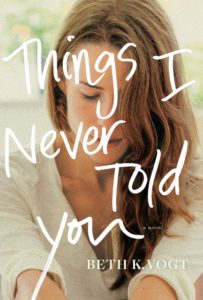 A nonfiction author and editor, who once said that she’d never write fiction, Beth K. Vogt has authored nine contemporary romances, including a 2016 Christy Award winner, a 2016 ACFW Carol Award winner, and a 2015 RITA Award finalist. Her novel Somebody Like You was picked as one of Publishers Weekly’s Best Books of 2014.
A nonfiction author and editor, who once said that she’d never write fiction, Beth K. Vogt has authored nine contemporary romances, including a 2016 Christy Award winner, a 2016 ACFW Carol Award winner, and a 2015 RITA Award finalist. Her novel Somebody Like You was picked as one of Publishers Weekly’s Best Books of 2014.
A regular blogger on her personal blog (and one of my personal favorites), In Others’ Words, she also contributes to Novel Rocket. When not writing, Beth enjoys speaking to writers’ groups and mentoring other writers.
She lives in Colorado with her husband, Rob, who has adjusted to discussing the lives of imaginary people, and their youngest daughter, Christa, who writes her own stories.
You’ve described your new book, Things I Never Told You, as “Little Women gone wrong… with a This Is Us feel.” Why?
Things I Never Told You is a story about things both spoken and unspoken between sisters. Little Women is a classic story that idealizes the relationships between four sisters. For all their differences, the March girls are undergirded by a sense of loving unity and, well, goodness. The Thatcher sisters? I replace idealism with the kind of reality you see in the popular TV show This Is Us. The conflicts separating Johanna, Jillian, Payton, and Pepper seem to outweigh the sense of family.
 In Things I Never Told You, you’ve given readers permission to have questions about their faith. Why do you think this is important?
In Things I Never Told You, you’ve given readers permission to have questions about their faith. Why do you think this is important?
Living a life of faith is hard. Choosing to believe in God doesn’t mean that you don’t doubt . . . that life is always good, that you’re guaranteed a permanent residence on the sunny side of Easy Street. A few years ago, I sat across from a trusted friend and said, “I know all the right answers, but they’re not working anymore.” I still believed in God, but life was harder than I ever expected. It’s important to know that God accepts us when we doubt. He is a big, big God—big enough to handle any and all of our questions.
Exactly! And just like life, great novels almost always have a plot twist that make the story better. Have you experienced a real-life “plot twist” recently. What did you learn from it?
A few months ago, my husband, seventeen-year-old daughter, and I got up early and drove through a snowstorm to the Denver airport . . . only to be told that our flight left from the Colorado Springs airport.
The irony is we live in Colorado Springs.
Cue me gasping my husband’s name. Me, my husband, and our daughter exiting the airport, only to turn around because there was no way we were going to make it back to the Springs in time to catch our original flight. Standing in line, using multiple cell phones to check alternate flight options. And ultimately paying several hundred dollars for another flight out and even more for a flight home.
What did I learn?
We were family during the entire time. We didn’t turn on one another. We didn’t blame each other. We figured it out. We laughed. Yes, it was an expensive mistake caused by a lot of external stress—but we kept the stress external and didn’t let the mistake become a weapon that we used against one another.
[ctt title=”It’s important to know that God accepts us when we doubt. He is a big, big God—big enough to handle any and all of our questions.” tweet=”It’s important to know that God accepts us when we doubt. He is a big, big God—big enough to handle any and all of our questions. ~ @bethvogt https://kathyharrisbooks.com/beth-k-vogt-thin…i-never-told-you/” coverup=”HveF2″]
Those who create usually tap into a personal “toolbox” of elements to define their style. For example, a painter might use color, light, or shadows in a certain way to “sign” his work. A musician might use syncopation, key changes, or vocal intonation to set herself apart. What two or three elements most define who you are as a storyteller?
Such an intriguing question.
Dialogue is key for me when I write.
I brainstorm in dialogue. I fast draft mainly in dialogue. I often say that in my first draft of a story my characters are naked, hungry, and homeless. Story comes to me in conversation . . . I hear it first.
The faith element of a story is also vital—the spiritual thread. I weave that in, pull it out, weave it in, over and over again. When I write, I don’t think about whether I’m writing to a CBA market or a general market—I just want the faith element to ring true.
And humor. You will always find some element of humor in any novel I write because humor is so needed in life. It provides emotional breathing space. I believe laughter is the most beautiful sound . . . it’s music.
You are one of the most prolific and enduring bloggers I know! What do you think is the key to a good blog—and having the staying power to stick with it? What’s your go-to source of inspiration?
Thank you so much for those encouraging words! I’ve had other people point out—in a “maybe you should fix this” kind of way—that my blog isn’t about writing or about books. And that is intentional. I blog about something I love: quotes. And I think that’s the main reason I stay with it—I’m blogging about a topic I never get tired of. There are endless fascinating, funny, intriguing quotes. I also try to use my own photography for the graphics, and that’s a hobby of mine, which makes it fun.
I have some basic blogging guidelines that I established when I started In Others’ Words: I keep the posts short—100 to 300 words—because people are busy; I always use a graphic because we’re so visual nowadays; and I end with a question because what I hope to do is start a conversation with people.
I have a variety of resources for quotes, but one of my favorites is my friend, Mary, who is always gifting me with books of quotes!
Thanks, Beth! It’s always nice to have you as a guest at Divine Detour.
Thank you. I love visiting here.
~ ~ ~
For more information about Beth, visit her website or follow her on Facebook or Twitter.
To purchase Things I Never Told You, log on to: